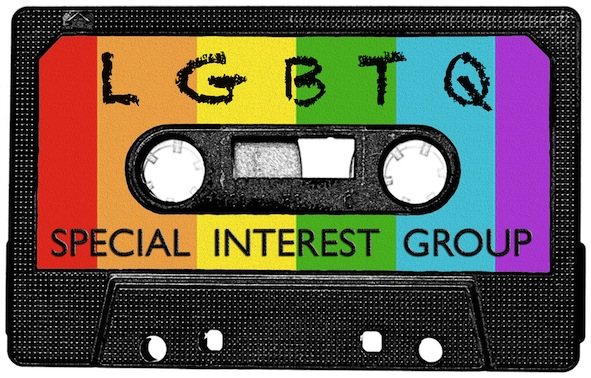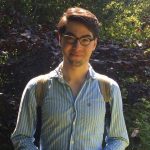The Annual Conference of the Oral History Society (OHS), held this year at Leeds Trinity University on the 14th-15th July, explored the theme of ‘remembering beliefs – the shifting worlds of religion and faith in a secular society’. Among many exciting panel discussions was that of the Society’s LGBTQ special interest group (SIG). Less than a year old, the SIG, chaired by Clare Summerskill, is a collective of Oral History Society members actively engaged in researching LGBTQ history. So often, at large mainstream conferences, papers on the queer past are shoehorned into broad, multi-focused panels. Whilst this sometimes has its merits, we felt it was refreshing and long overdue to highlight LGBTQ oral history as a subject in its own right, and showcase some exciting work by SIG members. We had the added bonus of being chaired by Dr Emma Vickers, who is well known for her research into the lives of British LGBTQ military personnel, and who movingly described the SIG as her ‘new family’ (a sentiment the panellists echoed).

The first paper came from Dr Alan Butler, historian of ‘queer Plymouth’. Drawing from his doctoral research and his ongoing work with LGBTQ archives in Plymouth, Butler discussed the role religion played in the lives of people he had interviewed, especially those who had contracted HIV/AIDS in the 1980s. Plymouth was described in the local press in 1987 as ‘the Southwest’s Homosexual Capital’, and, as Butler pointed out, the AIDS epidemic saw intensified scrutiny of the city’s queer population. Butler drew attention to ‘Bethany’, a house run by the Sisters of Mercy to care for PWAs (People with AIDS) in Plymouth, the majority of whom were gay men. Through his oral histories, Butler has recovered a wealth of stories about Bethany, with many recalling memories of supportive and nurturing nuns. A far cry from the homohysteric backlash of Plymouth’s local print media, the narratives collected in Butler’s oral histories add an interesting alternative dimension to the historical picture of queer Plymouth during the epidemic.
Next was my own paper on the intergenerational dynamics of oral histories of HIV/AIDS. I reflected on my desire to ask a leading gay priest why it was that, after the death of a gay, HIV+ monk who had been in his care, my interviewee had written for a replacement who should be ‘not too openly in support of gay issues’. My paper examined my subjectivity as an oral historian within that interview scenario: my feelings of admiration and respect (as well as pity) for my interviewee, which served to constrain my line of questioning. Drawing from Sarah Schulman’s work, I argued that this could be partially explained through the generational and experiential ‘wall’ between us, and suggested this is something that oral historians of HIV/AIDS need to be conscious of.
This was followed by an exploration of the religious lives of older lesbians by Dr Jane Traies. Expanding on research that appears in her recent book, The Lives of Older Lesbians: Sexuality, Identity & the Life Course, Traies noted that whilst a quarter of respondents to her initial survey were Christian, 18% had ticked ‘other’, significantly higher than the national average. This group contained a significant number of Quakers, humanists, pagans, and atheists, as well as several ‘spiritual’ women including a goddess worshipper, one follower of a Shamanic spiritual path, and an adherent of wicca. Using her oral history interviews with self-identifying lesbians born before 1950, Traies expanded on this quantitative data, noting that faith and religion exert a strong influence on the formation of identity, with older lesbians being no exception. Indeed, a fascinating case study highlighted one woman’s belief that she was ‘made in the lesbian image of God’, a conclusion she had reached in the face of an openly gay priest being sacked instead of receiving the promotion she felt he deserved. In Traies’s paper we saw the remarkable potential of oral history to recover LGBTQ experiences. Her interviews form a collection of lesbian memories that reflect and highlight the diverse, localised, and complicated faith relationships that queer people have experienced in modern Britain.
Finally, George Townsend used his oral histories of Parson’s Pleasure to examine the historical homosocial geography of Oxford’s male-only swimming hole, and the possibilities this presented for male same-sex activity (or suspicion thereof). The site, which was established in the mid-nineteenth century and only closed in 1992, inhabits a curious mental space within the city’s collective memory. Examining this, Townsend reflected on the narratives of innocence and guilt that emerged from memories of Parson’s Pleasure, often indicative of the ‘insider’ or ‘outsider’ status of the interviewee. He pointed out that these narratives of guilt and innocence were frequently mapped onto the body through a particularly Christian discourse, perhaps stemming from the religious homosocial beginnings of both Parson’s Pleasure as well as the University of Oxford itself. Townsend presented wonderfully humorous recollections of people who had bathed at Parson’s Pleasure, and those who were keen to define themselves merely as passive observers, offering the conference a snapshot of how oral history can help us to explore the sexual geographies of hidden (homo)sexual spaces and cultures.
In 1992, the Brighton Ourstory Project wrote ‘every lesbian and gay man is a walking library of information on our life and times … Our passions and experiences are worth preserving for future generations. They will want to know about our lives’. The OHS LGBTQ special interest group desperately wants to know about past LGBTQ lives. The OHS conference forced us to think about the place of religion in those lives. A number of us commented on the fact that, but for our involvement with the SIG, we might not have come to a conference on oral histories of religion and belief. Forced to revisit our material to prepare our papers, however, we all discovered that faith and (un)belief were rich and informative themes which ran throughout our interviews. Queer oral histories are full of complex, often competing narratives, and this conference highlighted the place of religious themes within these discussions. Oral history interviews with LGBTQ people have always unearthed religious narratives: memories of ‘coming out’ coinciding with either the loss, strengthening or change of faith, whilst more recent work on same-sex marriage has contended with obvious questions about the place of religion in these histories. Whilst LGBTQ oral history has made great advances in exploring elements of the queer self, personal reflections on religion and faith have not been adequately considered in the context of the oral history interview. In our future projects, the panellists and the other LGBTQ oral historians present will doubtless be more attentive to the role of religious narratives and memories in our work, and it is not unthinkable to suggest that we may be about to witness an exciting flurry of oral history work on the religious themes of queer history.
The OHS LGBTQ SIG tweet from @OHS_LGBT

George J. Severs is a PhD student in History at Selwyn College, Cambridge and an active member of the Oral History Society’s LGBTQ special interest group. His doctoral research investigates the history of HIV/AIDS activism in the UK during the 1980s and 1990s. George also co-convenes the Cambridge Gender and Sexuality History Workshop, and is curating the ‘personal testimony and memory’ theme of the 2018 London AIDS Cultures and Histories Festival. George tweets from @GeorgeSevers10

NOTCHES: (re)marks on the history of sexuality is licensed under a Creative Commons Attribution-NonCommercial-NoDerivatives 4.0 International License.
Based on a work at www.notchesblog.com.
For permission to publish any NOTCHES post in whole or in part please contact the editors at NotchesBlog@gmail.com





One Comment